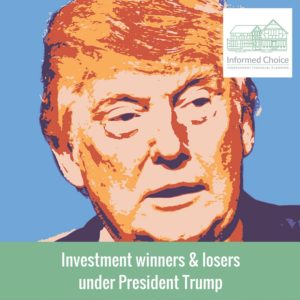 With the dust settling after the US Presidential election result last week, who are likely to be the investment winners and losers under President Trump?
With the dust settling after the US Presidential election result last week, who are likely to be the investment winners and losers under President Trump?
Tom Stevenson, investment director for Personal Investing at Fidelity International, has suggested healthcare, infrastructure, gold and retailers as potential winners once The Donald takes residency in the White House in January.
According to Stevenson, Trump’s victory could provide a much-needed tonic for the beleaguered US healthcare sector, which has struggled under the Obama administration.
Investors have been selling biotech and healthcare since last summer, when Clinton was rising in the polls. This resulted in the sector falling by 8.4% for the year.
Stevenson says that a ‘relief rally’ in the pharmaceutical sector could prove good news for funds with significant healthcare investments in the UK and globally.
He also suggests infrastructure could get a boost under President Trump.
Something Trump and Clinton both seemed to agree on as Presidential candidates was fiscal spending, and in particular spending on infrastructure.
Stevenson thinks infrastructure spending is likely to get a significant boost, with a focus on roads, bridges and airports.
[tweet_box]Healthcare, infrastructure, gold & retailers could be winners under President Trump[/tweet_box]
During times of political change and uncertainty, gold has been the traditional safe haven for investors.
Stevenson points to the near 4% rise in the gold price on election night last week, to $1,316 an ounce at one point.
That was the biggest jump for the yellow metal, which is often seen as one of the world’s safest assets, since the shock Brexit vote.
Investors have a range of options for exposure to gold in their portfolios, either directly in the asset or indirectly by investing in the shares of mining companies.
Stevenson explains that Trump wants a tax cut “across the board”. According to the Tax Foundation, this means that even middle class earners, who earn roughly $50,000 a year, will be more than $1,000 a year better off.
Trump also proposed a cut in the corporate tax year, from 35% to 15%. This is not just for large corporations but also the self-employed and small business owners.
If this policy encourages more new businesses, it is likely to boost the economy.
Stevenson says this all adds up to suggest that consumer spending will see a boost – benefiting retailers and restaurant operators in particular.
He also highlighted a potential investment loser when President Trump come to office.
Stevenson says that opinions remain split on the effect of Trump’s policies on the financial sector.
On one hand, he has appeared unwilling to saddle banks with more regulation. And financial stocks will certainly benefit from the loosening of the Dodd-Frank regulations.
On a shorter-term basis though, a sell-off in global markets is expected by many analysts to deter the Federal Reserve’s long-awaited interest-rate increase in December.
And that would lower long-term borrowing costs and squeeze the banks’ profitability further.

